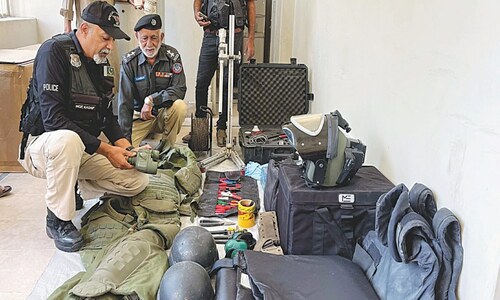KALOI/NAUKOT/BADIN: The landscape remains the same everywhere. Improvised tents of farm workers dot bypasses and roads since the rains that battered lower Sindh’s districts, especially Mirpurkhas and Badin, in the previous month.
Underprivileged communities — mostly from religious minorities and peasants — are left to fend for themselves.
Staying under the open sky, they go through major trauma in the aftermath of the heavy rains. For the past several days, they have been waiting for rainwater to recede from their villages, located in nearby farmlands owned by their landlords.
Last leg of the monsoon rains that hit lower Sindh’s districts of Mirpurkhas, Badin, Sujawal, Sanghar and Umerkot, primarily agricultural lands, proved disastrous. The downpour has also triggered displacements temporarily of these communities.
The situation is identical to one that was seen in 2011 rains and flooding that wreaked havoc across lower Sindh. Displaced people have shifted to higher ground, banks of drains/irrigation canals or elevated surfaces along main roads and bypasses.
Villagers now pass sleepless nights as mosquitoes and insects invade environs after sunset. Stray dogs walk around them. And their unkempt and unclean children, mostly underdressed, prefer to play completely oblivious of the disaster that visited their families.
Many poor growers have sustained major losses
Tears rolled down the cheek of an elderly woman as she tried to narrate her ordeal. Vast areas in these districts still remain submerged under rainwater, blocking access to villages.
Villagers still put on a brave face despite facing miserable conditions.
There seems no respite for them after the rains played havoc in their areas. “Nobody knows when water will recede and when we will return to our lands,” says an elderly Kasar Bheel in a roadside makeshift tent on the Mirpurkhas-Kaloi road. “It is going to take around a month or so,” interjected a community fellow. “Till then we are here to bear with these conditions,” he says.
As rainwater stagnates, local zamindars try to dewater their fields by giving cuts to their lands to release water in different drains.
Naukot bypass remained closed since Aug 26-27 midnight when a breach occurred in Left Bank Outfall Drain (LBOD) that later widened to 400ft and caused flooding in Naukot. It is yet to be plugged. After hitting Naukot, a few residents of Kaloi taluka told Dawn at the breach’s site that the breach water had entered a few pockets in a couple of union councils of Mithi district’s Kaloi taluka, stronghold of the Arbabs.
“Some God-fearing people provide us food,” Laschman Kohli says as he, along with several other of his community fellows occupy a strip of the Mirpurkhas-Jhuddo road, placing some wild bushes around their cots — lined in a row — so that those driving on the road could easily notice them from a safe distance to avoid any mishap.
Livestock also vulnerable
Men like Ali Nawaz Dal try to protect cattle and livestock which is his source of livelihood. “Nothing [government assistance] has reached us. I have arranged this sheet on my own,” he adds while placing fodder inside a covered space where he would keep his cattle so that mosquitoes should not affect them. “Mosquitoes and insects make cattle and goats restless, cause infection and they fall ill,” Dal says.
Cattle and livestock of these displaced people are staying in the open as well. Their fodder availability has become difficult as well because lands still remain submerged under rainwater. Their owners are hardly able to arrange it from different areas.
No camp of the Sindh livestock department was, however, seen at least in the areas visited by this reporter, for vaccinating cattle as earlier claimed by Provincial Minister Bari Pitafi. Required mobile healthcare facilities from the Sindh health department were not there either for such a large number of people to counter outbreak of waterborne diseases.
These marginalised communities are set to bear with a heavy socio-economic cost. Damages to their summer crops mean direct economic losses to them since agriculture is their bread and butter. Haris like Kasar Bheel and Tota Bheel are partners in each crop with their farmland owners. And they have lost their 50pc share in crops like cotton, chilli, rice and vegetables. And they have lost their 50pc share in Kharif crops.
“Cotton and chilli crops are destroyed,” says Tota Bheel in Kaloi. He says cotton crop was being bought between Rs4,000 and Rs4,200 per 40kg while chilli had been fetching a price of Rs35,000 per 40kg before rains. “I had cultivated chilli on five acres and cotton on one acre of land that had been submerged under rainwater. So, my entire labour is gone now. My landlord perhaps can still bear it, but I can’t,” says Tota Bheel.
Cotton production is already on decline in Sindh for past several years for a variety of reasons, including substandard seed. The downpour badly destroyed cotton and rice crops. Accumulated rainwater blackens cotton plants while heavy moisture affects quality of remainder of the crop with the result that cotton ginning factory owners hardly offer adequate prices. The crop which is under water would have to be disposed of as plants would not survive.
The Sindh and federal governments have provided some tents and relief items through the Provincial Disaster Management Authority (PDMA). The Sindh PDMA’s website showed that 2.279m population was affected across the province, including Karachi, during the rains since July 6 to Sept 6 while crops were affected on 1.094m acres. But The PDMA does not mention figures of the displaced persons or communities. Total 23,629 persons stay in relief camps.
Published in Dawn, September 9th, 2020














































Dear visitor, the comments section is undergoing an overhaul and will return soon.